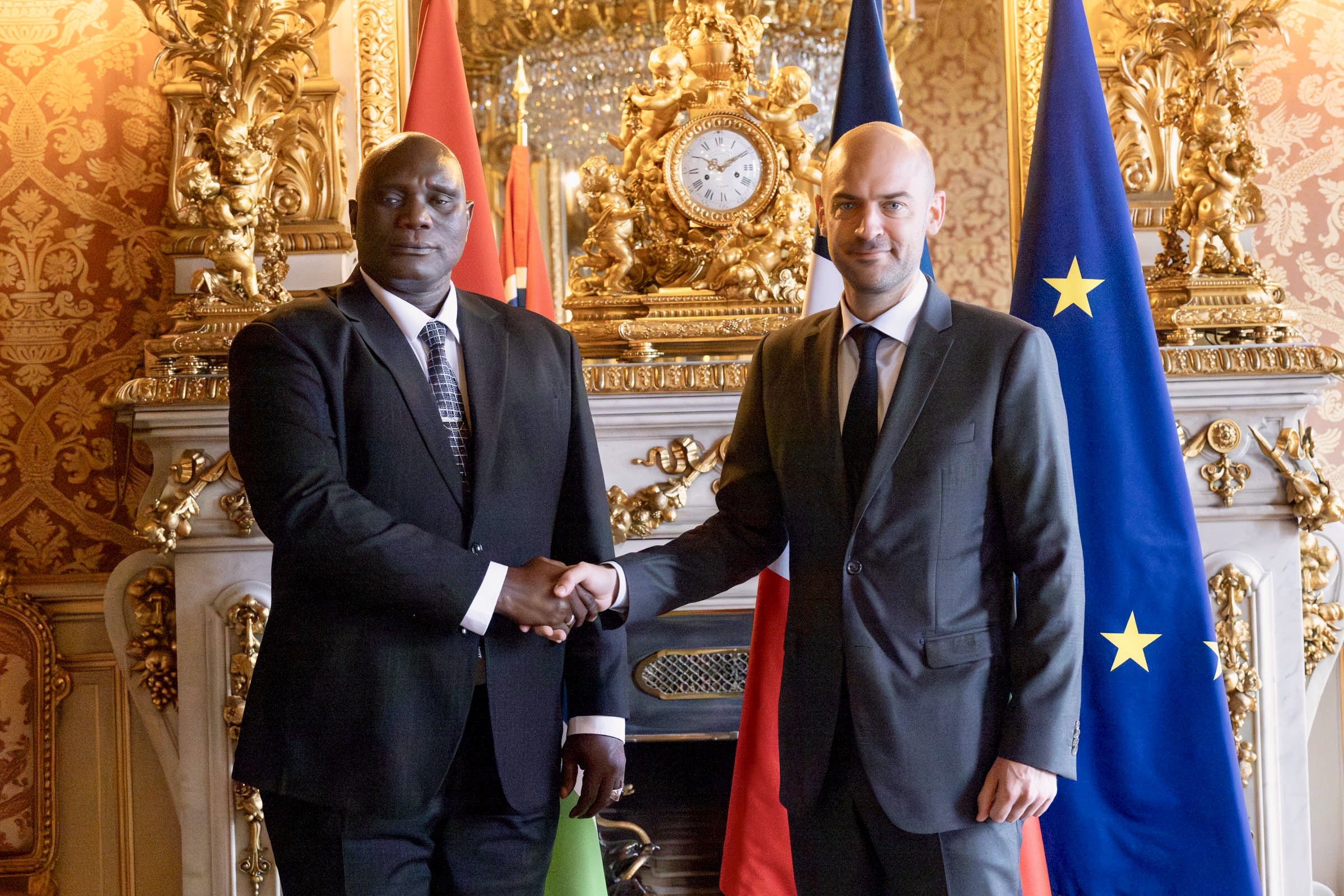Gambiaj.com – (Paris, France) – In a move signaling Gambia’s renewed foreign policy direction under its recently appointed top diplomat, Foreign Affairs Minister Sering Modou Njie met with French Minister for Europe and Foreign Affairs Jean-Noël Barrot in Paris on Wednesday, July 24. The high-level meeting marked Njie’s first official visit to Europe in his new role and underscores Banjul’s intent to deepen its relationship with France and the broader European Union.
At the core of the meeting was a mutual reaffirmation of strong bilateral ties, described by both parties as having “gained new momentum” since the fall of Yahya Jammeh’s authoritarian regime in 2017 and the subsequent democratic transition.
They declared that they share “converging views on international issues” as well as a “mutual commitment by France and The Gambia to peace, democracy, the fight against climate change, and the protection of the oceans.”
The statement also highlighted “France’s tangible support to The Gambia since 2018, notably through projects by the French Development Agency (AFD) in the areas of water, agriculture, biodiversity, and resource mobilization.”
Since then, France has emerged as a key development partner, with support focused on essential sectors such as water, agriculture, biodiversity, and resource mobilization — largely implemented through the French Development Agency (AFD).
What This Means for Gambia’s Diplomacy
Minister Njie’s diplomatic engagement with France carries significant meaning for Gambia’s foreign policy on several fronts.
Firstly, it reflects a continuation — and possible intensification — of the country’s westward diplomatic pivot post-Jammeh, which prioritized democratic values, human rights, and multilateral partnerships.
By choosing France for his first major bilateral meeting, Minister Njie signals Banjul’s commitment to consolidating historical and strategic relationships with European powers, particularly in areas aligned with Gambia’s development priorities.
France’s ongoing investments through the AFD — in sectors ranging from clean water infrastructure to climate resilience — are viewed in Banjul as a lifeline for the country’s fragile economy.
Furthermore, the Ministers’ shared emphasis on “peace, democracy, climate change, and ocean protection” points to a values-based diplomacy that aligns with Europe’s current foreign policy approach under the Global Gateway strategy — the EU’s answer to China’s Belt and Road Initiative.
This alignment could position Gambia as a gateway for European interests in West Africa while also attracting increased development financing.
Cultural and Economic Diplomacy on the Rise
The French side also highlighted the “vibrancy” of the Alliance Française in Banjul and an expanding French economic presence, indicating that the relationship is not only political but also cultural and commercial. The strengthening of trade ties and investment channels could help diversify Gambia’s economic partnerships and reduce overdependence on traditional donor nations.
Njie’s outreach also comes at a time when France is reassessing its diplomatic and security presence in West Africa, following recent geopolitical rifts with military-led governments in the Sahel. Gambia’s stability and democratic credentials make it a reliable partner in a region where France is looking to recalibrate its alliances.
With the EU increasingly focused on curbing irregular migration through development partnerships and return agreements, Gambia’s foreign minister may also be leveraging this diplomatic engagement to negotiate more favorable conditions for Gambian migrants in Europe and to secure additional support for job creation at home.
The meeting concluded with both parties expressing satisfaction and a commitment to “expand the friendship and cooperation between our two nations for the mutual benefit of our citizens.” That language reflects an intent to translate diplomatic goodwill into tangible outcomes, including potential new funding streams, trade initiatives, and educational or technical exchange programs.
As Minister Njie begins to shape his tenure, this visit offers a glimpse into a foreign policy that values tradition but aims to innovate — blending historical ties with strategic modernization.
For Gambia, deepening ties with France and the EU could be more than symbolic; it could shape the trajectory of its international development and security partnerships for years to come.










